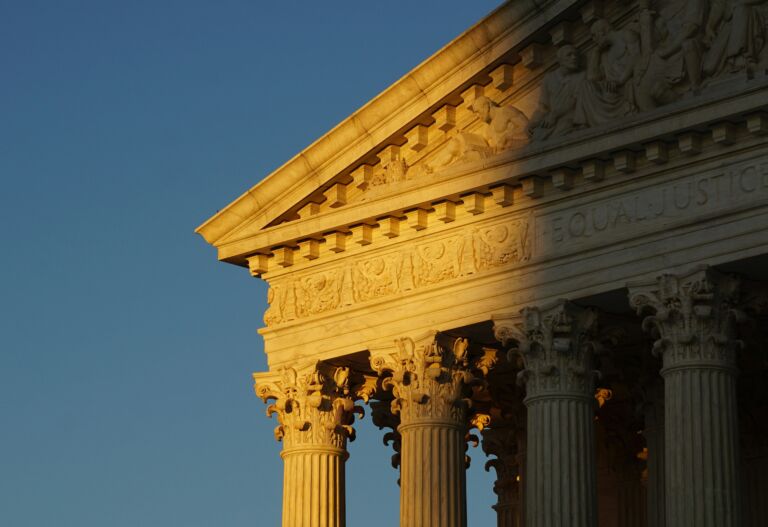My latest article for the American Institute for Economic Research finds a flicker of good news amid the blizzard of bad news that has marked the Biden years so far. That good news is the recent Supreme Court ruling in West Virginia v. Environmental Protection Agency:
The issue before the Court was how broadly the EPA could interpret its mandate from Congress in the 1970 Clean Air Act, especially Section 111(d), which has been described as “an ancient and seldom‐used provision.” The Court for the first time in a majority opinion invoked the “major questions doctrine,” under which it explained that “separation of powers principles and a practical understanding of legislative intent” means “the agency must point to ‘clear congressional authorization’ for the authority it claims.”
This doctrine is a welcome rebuttal to the presumptions under the regnant but highly problematic Chevron doctrine. As explained by Tom Merrill, author of The Chevron Doctrine: Its Rise and Fall, and the Future of the Administrative State (Harvard University Press 2022), that doctrine had evolved to the point that “it is not necessary to identify a delegation of power to act with the force of law with respect to the specific statutory provision in question; it is enough that Congress has in general terms authorized the agency to act with the force of law.” Courts would essentially defer to an agency’s assertation of specific authority even if the supposedly authorizing legislation delegated only a general authority — a devil’s playground for hyperregulation.
It got so bad that unelected federal bureaucrats needed only a vivid imagination to justify a power grab never intended by Congress. You can see this problem from this passage in the Court’s ruling:
EPA claimed to discover an unheralded power representing a transformative expansion of its regulatory authority in the vague language of a long-extant, but rarely used, statute designed as a gap filler. That discovery allowed it to adopt a regulatory program that Congress had conspicuously declined to enact itself. Given these circumstances, there is every reason to “hesitate before concluding that Congress” meant to confer on EPA the authority it claims under Section 111(d).
The issue gets to the difference — but also practical similarities — between laws (made under constitutional authority by elected legislators) and regulations (supposed to be made under limited, delegated authority by legislators to unelected executive-branch agency bureaucrats). It’s something we’ve discussed here frequently. For a good starter, read this Freedom Focus article titled “Freedom, Transparency, and Good Government Require Keeping Regulations Under Control.”
As explained in the article:
Formal rulemaking is governed by the Administrative Procedure Act (APA), a lengthy procedure with many hurdles. Nevertheless, it is much easier to finalize a rule than to pass a law. In their understanding of human nature and suspicion of consolidated power, the Founders made Congress a bicameral legislature with staggered terms of office, with one result being it is difficult even with partisan majorities to pass legislation.
I discuss the shortcomings of the Congressional Review Act of 1996 (CRA), Congress’ attempt to solve this problem, which still requires drafting and passing a resolution disapproving a regulation and therefore still a much heavier lift than proposing and finalizing a rule. I then discuss the failure so far of Congress passing a stronger regulatory review act, the Regulations in Need of Scrutiny (REINS) Act, which would prevent the implementation of any agency rule with an estimated economic impact above $100 million or that would raise consumer prices or pose harmful economic effects unless Congress took the time to issue a resolution approving it.
The implications have caused our federal government to stray very far from constitutional rulemaking:
With the costs so stacked against Congress and the courts so willing to defer to their imaginative rulemaking under Chevron, federal agencies realized they had nearly unchecked rulemaking power. They even learned they could regulate outside of APA rulemaking by making what regulatory expert Clyde Wayne Crews Jr. calls “regulatory dark matter” — their “guidance documents, proclamations, memoranda, bulletins, circulars, letters and more that are subject to little scrutiny or democratic accountability but carry practical, binding regulatory effects.” They’re not proper rules, but they’re things the agencies treat like rules.
It is why Pres. Obama could boast of being able to rule outside of Congress with “a pen … and a phone.” …
The administrative state was proven to be a vast storehouse of unrealized though unconstitutional power. Even if Republicans were to gain control of Congress, they would face a daunting task to counter Pres. Joe Biden’s notorious “so sue me” approach to hyperregulation. From his eviction moratorium to his vaccine mandates and more, Biden has shown he will openly suggest he lacks the constitutional authority for his administration to do what it is doing, while trusting that Congress won’t act and that the courts would likely allow it, and mostly trusting that the opportunity cost to various parties of challenging him would render the prospect not worth it.
With that background, here is why I find the Supreme Court’s elevation of the “major questions” doctrine in WV v. EPAto be such an important judicial check:
The administrative state’s cynical calculus has been upended. It can no longer count on courts to okay their claims of discovering hitherto unnoticed devastating powers tucked away in “gap filler” statutory language while Congress was unwilling to spend the time and political capital to disapprove it under the CRA.
It’s good news. How good will depend on how serious the courts prove in the coming years about expecting agencies to stay within their statutory and constitutional bounds. In the meantime, Congress should reassert their legislative power by passing the REINS Act. The issue is systemic, not partisan. An out-of-control administrative state is an existential threat to the American system of government.


